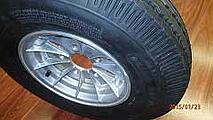 Nursery self tracking trailers are generally used for transporting potted plants to and from growing areas. Every nursery trailer runs on wheels which can have different tyres and rims with various characteristics and benefits. In the market, there are many different types of trailer wheels to choose from e.g. tyres on plastic rims, tyres on wheel barrow wheels, tyres on aluminium alloy rims, solid tyres, turf tyres all with different roller and precision bearings. It can be very confusing.
Nursery self tracking trailers are generally used for transporting potted plants to and from growing areas. Every nursery trailer runs on wheels which can have different tyres and rims with various characteristics and benefits. In the market, there are many different types of trailer wheels to choose from e.g. tyres on plastic rims, tyres on wheel barrow wheels, tyres on aluminium alloy rims, solid tyres, turf tyres all with different roller and precision bearings. It can be very confusing.
Pneumatic wheels are ideal for moving loads over rough and uneven surfaces. The tyre tread provides the 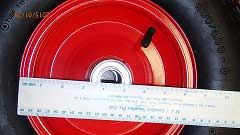 wearing surface and grip, the tyre carcass and tube contain the compressed air which is flexible allowing for impact absorption and finally the wheel rim supports the whole assembly.
wearing surface and grip, the tyre carcass and tube contain the compressed air which is flexible allowing for impact absorption and finally the wheel rim supports the whole assembly.
The purpose of this article is to give you a better understanding of nursery trailer wheel types to help you in your maintenance program or your purchasing decision. Scroll down to see the whole guide or click on the links below:
2. How important is the tyre pressures?
3. How to maintain your Nursery Trailer Tyres?
4. Is it a good idea to use second hand tyres?
5. Things to consider on trailer tyre and wheel rim selcetion
1. Why trailers wheels fail?
A main cause of nursery trailer wheel rim or tyre failure is overloading. It's essential to know the weight of the actual load or the payload under tow, including the combined weights of the carried goods and the actual weight of the trailer itself.
An over-loaded tyre will produce excessive heat in the sidewall and tread, which can cause tire degradation or a tyre blowout suddenly. Excessive heat is a major cause of trailer tyre failure. The problem increases in hot areas where roadway surface temperatures are extremely high.
2. How important is the tyre pressures?
Tyres pressure is another main cause of tyre failure and has a huge impact on the successful operation of trailers in a nursery. It is normal for air filled wheels to lose tyre pressure over time even if they are not being used. If the tyre is too hard, it bounces pots and equipment during the transportation. If the pressure is too low, the tyre, tube or rim is damaged. Low tyre pressures cause loads to become unstable. It’s the air pressure that supports the load. Potential injury to the operator or bystanders is likely to occur with low tyre pressures.
Having hard tyres with too much air is not recommended. Over-inflated tyres are more likely to cut, puncture or fail by sudden impact. On the other hand, under inflation is the number one contribution to trailer tyre failure. Low inflation pressure elevates tread temperature, especially as speed increases. A tyre can lose up to half of its air pressure while not appearing to be flat.
Please Note: Operation of tyres on a trailer that is 30 percent under-inflated can reduce tyre lifespan by approximately 55%, while decreasing fuel efficiency by as much as 10 percent.
3. How to maintain your Nursery Trailer Tyres?
- Remember to check tyre pressures regularly with a quality tyre gauge.
- Never exceed the maximum load rating branded on the tyre sidewall or the maximum vehicle load rating.
- Try to distribute the load evenly across all tyres where possible so that no single tyre is overloaded.
4. Is it a good idea to use second hand tyres?
- Rubber on tyres perishes over time, (aging or hardening of the rubber and cracking) this may cause dangerous blowouts when moving at speed.
- When an accident does happen, your trailer and loaded goods may get damaged not to mention your day being ruined.
- Care must be taken when obtaining second hand tyres.
- Depending on what you use your trailer for; where loads are lightweight, second hand tyres are good enough to handle the job.
- Most trailers do low kilometres and don't get used very often and generally carry small light loads.
- A blow out is not normally an issue. A good example where second hand tyres are used is on farm trailers where tyres could last for years and never have a blow out.
5. Things to consider on trailer tyre and wheel rim selcetion
5.1 Types of wheel rims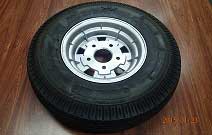
As stated in the first paragraph, there are many different types of trailer tyres and wheel rims used on nursery trailers. There are 1 piece rims, 2 piece rims, and 1 piece polypropylene (plastic) rims, steel wheel rims with roller bearings or pressed metal bearings and aluminium alloy wheels with taper roller bearings. There are solid tyre wheels (used on low loader trailers) and wide turf tyres for sandy or delicate grass areas e.g. sporting ovals, bush regeneration areas and grass lawns.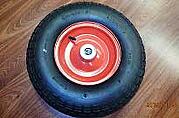 Note:
Note:
- 2 piece rims are used for foam filled wheels where there is potential for sharp objects to penetrate the tyre, or where regular maintenance checks are not necessary. You cannot leave a load on the trailer or a flat spot will develop. Sounds a good thing but the load carrying capacity is reduced to 120 kgs per wheel and the trailer cannot exceed 15km/hr.
- Steel wheel rims also vary in thickness of steel 0.6mm to 2.0mm. The thicker the rim, the stronger.
- The load capacity of the rim and the tyre may be different to each other. So the lowest rating is the maximum load capacity of that wheel.
5.2 Load Capability
Rims and tyres have different load ratings at different speeds. Steel wheel barrow wheels with standard roller bearings can be rated from 120 kgs to 230 kgs per wheel. Plastic tyres and rims can be rated between 100kg to 150 kg per wheel. For example, if a nursery trailer has four (4) polypropylene plastic wheels its maximum trailer load carrying capacity would be 600 kg.
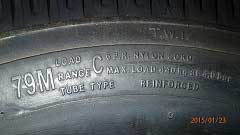
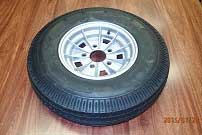
5.3 Bearings
(1) Tapered Roller Bearings
Aluminum alloy nursery trailer wheels are mounted onto a 5 stud Holden Hub that has a tapered roller bearing. The same specification as that used on registered road worthy vehicles as used in older Holden cars and box trailer applications.
(2) Shielded straight bearings VS normal pressed bearings
Nursery Trailer Wheel’s Shielded ball bearings are generally fitted into the toughened steel rim of wheel barrow wheels. These are usually lubricated to last for their operating life.
These bearings can last 3 times longer than normal pressed bearings.
(3) Tread patterns
Tread patterns are a limited consideration when pushing or pulling but “ply ratings” determine the quality or loading of a tyre.
(4) Ply rating
Ply rating is a ‘strength’ rating – it does not mean that there are 4 layers of ply in a 4 ply tyre for example. The higher the ply rating the greater the load capacity.
(5) Size of rim
There are large diameter rims as on cars and small diameter rims as on nursery trailers. The disadvantage with the smaller rims is that it is hard to change or repair punctures and they need to be taken to a tyre repair business. With the cheaper smaller wheels it is debatable whether they are worth repairing. Keeping spare tyres and rims in stock minimizes your potential down time.
(6) Aluminum Alloy wheels VS Steel wheels
Alloy wheels have the advantage of being as strong as their steel equivalent but lighter. Alloy wheels are not prone to rust or being affected by weather which can occur with painted steel wheels. There is no need for paint or any other protective coating. The Disadvantage is if severe damage occurs they are not easily or in most cases able to be repaired.
Example: C-Mac’s info on Deluxe Self Tracking Trailers Alloy Wheels
| Load capacity and speed ratings |
Wheel 375kgs, 425kg/Tyre 130 KPH |
| Tyre quality (ply rating) | Minimum 6 ply but normally 8 ply |
| Where commonly used (besides self tracking trailers) | Small Boat or Jet ski trailers for highway use |
(7) Why Choose Australian Made Alloy Wheels?
- Quality guaranteed products
- Supporting Australian manufacturing
- Providing young people an opportunity to learn and develop new skills.
In Conclusion
Gaining a better understanding of your nursery trailer wheel specification and your actual requirements to suit the terrain conditions and load carrying capacity is very crucial to the life of the trailer and efficiency of your operations. If you look after your trailers tyres, your tyres will look after you by helping you transport loads smoothly and efficiently without ruining your day.
For further technical information on nursery trailers tyres, please refer to your local trailers manufacturer.
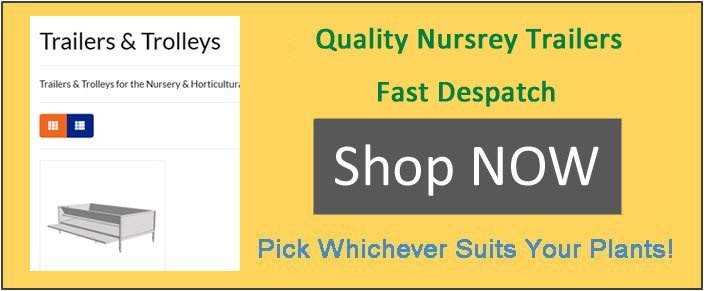
If you like this article and found it valuable to other people, click the social media icons below to share it!








